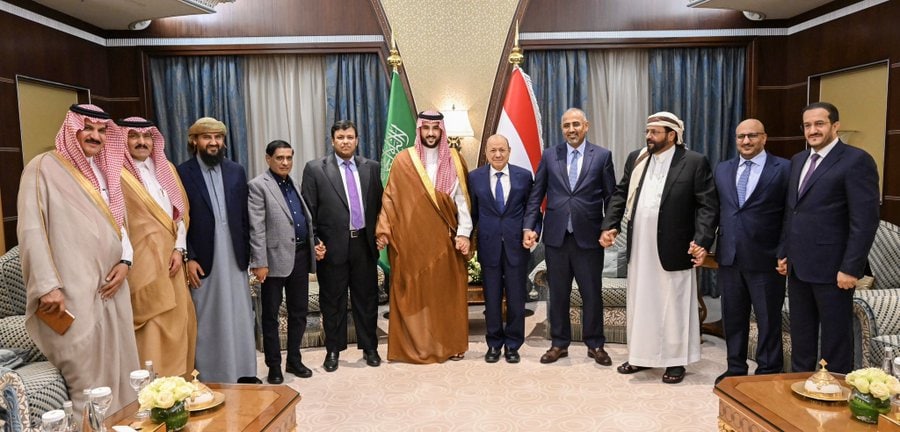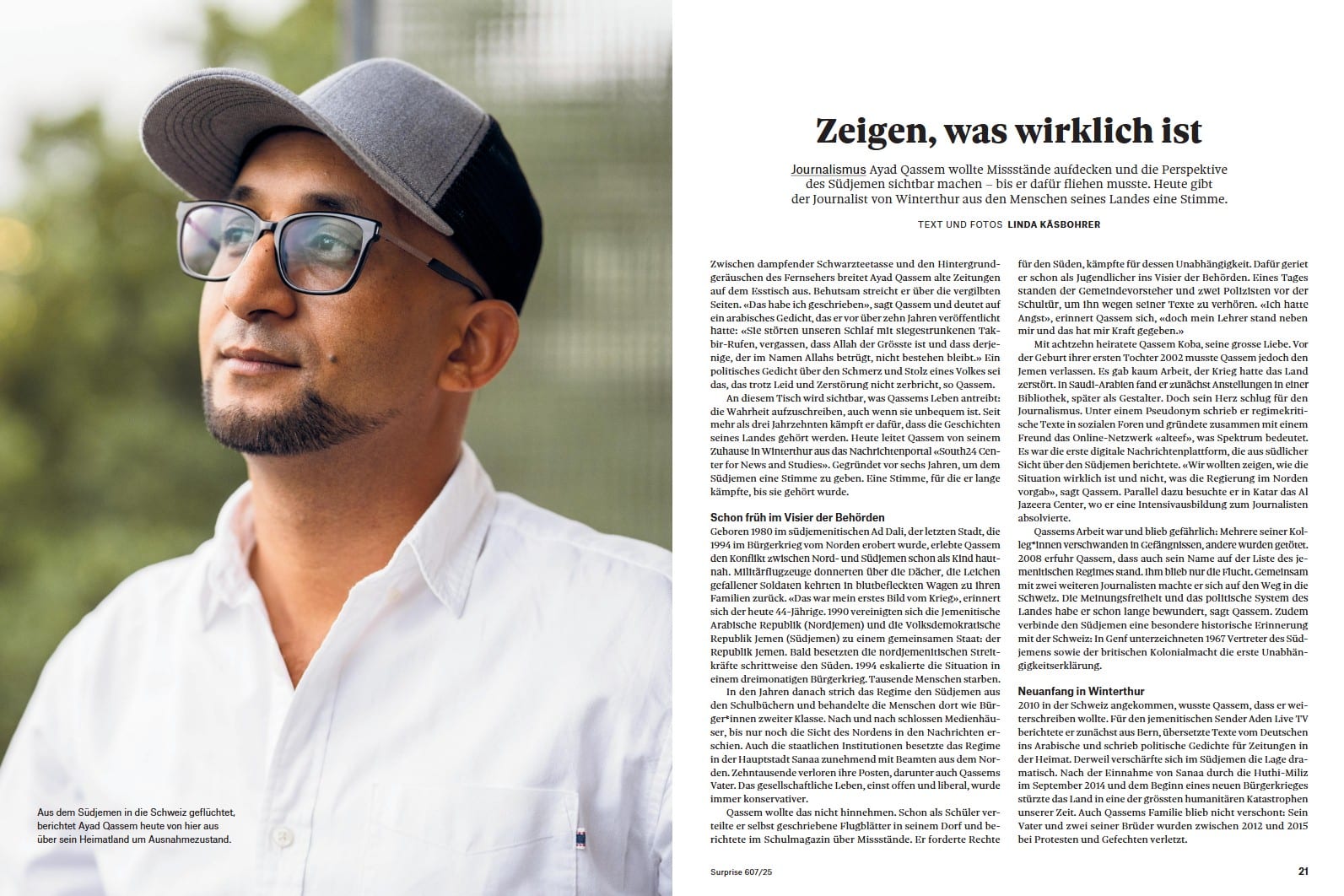
Saudi Defense Minister Prince Khalid bin Salman meets the Presidential Leadership Council in Riyadh. September 28, 2022 (official)
آخر تحديث في: 28-09-2022 الساعة 9 مساءً بتوقيت عدن
Abdullah Al-Shadli (South24)
On April 7th, former Yemeni President Hadi announced transferring his constitutional powers to the a new Presidential Leadership Council which consisted of 8 members. This came in the wake of a Presidential decree to dismiss his vice president, the Northern military general Ali Mohsen Al-Ahmar who is affiliate with Islamists.
The decision designated Rashad Al-Alimi as the Chairman of the PLC while its members include Aidrous Al-Zubaidi, Sultan Al-Aradah, Tariq Saleh, Abdulrahman Al-Muharami, Abdullah Al-Alimi, Osman Majali and Faraj Al-Bahsani. The decision gave the seven members the rank of vice presidents.
The PLC, which is considered Yemen's most prominent political shift from the very beginning of the crisis, is about to complete its 6th month since inception. While there is disparity among its members who have different agendas and goals based on the forces and entities led by those figures, the PLC still seems coherent despite the intensification of problems and challenges in front of it.
However, this coherence today may face real threats with the escalation of possible disputes among its members due to some reforms made by the PLC in the government and judiciary that mostly targeted the Islah party which dominated the official state institutions.
On May 25th, the PLC appointed Judge Qaher Mustafa as Yemen’s Attorney General to replace Ahmed Al-Moussai, the military figure who has close ties with the Islah. On July 28th, it appointed Lieutenant General Mohsen Al-Daari as Yemen’s Minister of Defense to succeed Lieutenant General Mohammed Al-Maqdashi who is also close to the Islah.
On August 4th, the PLC made major judiciary reforms that overthrew the Head of the Supreme Court Judge Hammoud Al-Hitar who is affiliated with the Islah and appointed a new leadership in the Supreme Judicial Council and the Supreme Court.
Meanwhile, the tense security and military situation in Shabwa Governorate reached its peak following clashes between the security forces affiliated with the Islah and the STC-affiliate Shabwa Defense Forces.
The situation in Shabwa pushed Governor Awad Al-Awlaki to sack Brigadier General Abd Rabbo Lakab from the leadership of the Special Forces. The latter refused the decision, and this caused battles that lasted for days in Ataq between the Southern forces and the local authorities on one hand and forces affiliated with Islah on the other hand.
Ataq battles expelled Islah-affiliate forces on August 10. At the eve of that day, reports were circulated about the resignation of the PLC member Abdullah Al-Alimi before he backtracked on that in the following day according to Reuters.
On August 12th, the Islah issued a statement in which it condemned Shabwa's events and threatened to withdraw its participation “in all fields” unless the Governor of Shabwa is dismissed earlier, PLC established a committee, led by Defense Minister, to investigate the situation in Shabwa and it issued decisions to sack military and security leaders involved in what it called “insurgency” against the local authorities.
Since then, PLC has not held a meeting of all its members. This has been the case even much earlier than as some members such as Tariq Saleh and Sultan Al-Aradah had previously left Aden to areas controlled by them in Mocha and Marib.
During a joint symposium with the former US Ambassador to Yemen on Friday, Rashad Al-Alimi admitted that there are disputes inside the PLC. He said: “There are disputes within PLC, but we are keen to maintain the common grounds”.
He added: “I have not used the voting right inside PLC in order not to produce winners and losers. I seek to postpone the disputable issues. PLC’s members are convinced that fighting leads to problems and that dialogue is the safest way to solve them.
Performance and compatibility
As for PLC’s performance and compatibility in the past period, journalist, and political analyst Saleh Al-Baidani told “South24”: “I think it too early to judge the performance and compatibility of PLC. However, there are indicators, some of them positive and others negative. This is part of the complexities of the Yemeni scene we have been accustomed to”.
For his part, senior STC official Mansour Saleh believes that PLC’s performance is doing well.
Saleh told “South24”: “There are distributions of tasks internally. The contacts between PLC’s Chairman and members are ongoing. Moreover, there is compatibility regarding the confrontation and the treatment of different files. This was shown in the PLC’s strong stance towards insurgency in Shabwa and the "Arrows of the East" and "Arrows of the South"
However, Ali Salem bin Yahya, the chairman of “Taghyeer Center for Strategic Studies” believes that “PLC’s performance is bad and has not delivered anything new”. He told “South24”: “PLC walks on the same path of former President Hadi. It has not made any political or economic solutions”.
The Islah withdrawal
As for threats delivered by the Islah to pull out its participation in all fields and from PLC, Mansour Saleh said: “The Islah won’t do that unless it will pay a heavy price”.
He added: “The Islah is an opportunist party. It Is haunted by their love of power. However, it suffers from schizophrenia by practicing the roles of the ruler and the opposition simultaneously. It is a trait that has accompanied it for years”.
He believes that the “Islah withdrawal is in the interests of PLC and will strengthen the anti-Houthi front” Saleh added that the presence of this party within the internationally recognized government does not add anything and that its exit won’t be harmful”.
He added: “The PLC has defined political, economic, and military goals and it is obligated to do it. There are big efforts exerted in such a direction. We wish that things go well towards achieving the PLC’s goal and maintaining it. It is the last opportunity to defeat the Houthis and terrorism forces that follows their same pattern”.
Nonetheless, Journalist Abdulrahman Batis believes that the Islah recent moves are justified. He told “South24”: “the PLC’s decisions were not proper. They caused bloodshed and killing of innocents in Shabwa and Abyan”.
Batis said that the Islah-affiliate forces “were dictated by their conscience”. He believes that “punitive measures should be taken against Shabwa Governor who contributed to dismantling those forces who carried out their duty without salaries”.
The risks of divisions
Saleh Al-Baidani downplays the risks of the PLC’s divisions and excludes this. According to him " "media outlets amplify things and claim that there are divisions within PLC".
He believes that this aims to “achieve political goals and an attempt to pressure PLC". He added: "We obviously saw this through some statements seeking to suggest that PLC has been divided since the Shabwa's events. However, in reality PLC has been cohesive, especially in the face of what happened in the governorate".
He added: "That political party has sought to hinder the transformations we have experienced after PLC’s established in the form of Presidential decisions that made changes in some institutions, foremost of which is judiciary".
Journalist Abdulaziz Mousawi said that the PLC is "coherent and has been able to contain everyone".
"Even if there are disputes, they won't be like before. There is a huge difference between the case of one component of the internationally recognized government who sees other components as militias and the case when all components are unified while one component only is out of ranks," he told "South24".
Foreign calls
On September 2nd, Tariq Saleh met with the US Ambassador to Yemen Steven Fagin who urged on PLC’s unity according to a tweet by the US embassy.
It was not the only one in which a Western ambassador spoke about the PLC’s unity. On September 12th, EU's Ambassador to Yemen Gabriel Munuera Viñals called for the same thing during a video call with Major General Aidrous Al-Zoubaidi.
Likewise, French Ambassador to Yemen Jean-Marie Safa expressed his country's support for PLC's unity. This came after a meeting with the Yemeni Defense Minister in Riyadh.
Such calls and statements stir questions about the real situation inside PLC and whether they reflect a state of division within it or the Western concerns towards this.
Commenting on these calls, Mansour Saleh said: "This is the focus of everyone, especially that the PLC represents different components who have divergent projects".
He added: "There are attempts to put some obstacles against PLC, especially the Islah's representatives (Abdullah Al-Alimi and Sultan Al-Aradah) who have shown lack of enthusiasm towards some issues such as the war against terrorism and transferring the revenues collected by the authorities affiliated with the party to the Central Bank in Aden".
Al-Baidani believes that the foreign statements are "a direct reflection of what is done by the political party who seeks to show PLC as being divided". He added: "This party holds meetings with foreign ambassadors and speaks about PLC’s divisions in an attempt to blackmail the latter and pressure it".
Solutions
On how to solve the PLC’s problems, Saleh Al-Baidani said: "I think that the PLC will overcome many obstacles. A form of sorting will take place which will lead to a new political horizon and alignment within the PLC in the upcoming period".
He added: "According to the PLC’s policy decision making, there are many ways of treatments. PLC’S Chairman can resort to using his rights along with other members".
He continued by saying: "They are the majority while one or two members refuse to participate in PLC. There are probably slight differences between the other members, but they can be bypassed. I think that PLC will gather soon in Aden".
With the imminent end of the third UN truce on October 2nd, and amid international calls to expand the truce towards a comprehensive peace agreement, some ask about the nature of the PLC’s next moves to maintain cautious compatibility among its different members and to what extent it will continue postponing these disagreements or it will treat them ultimately; especially after the arrival of the entire PLC's members to the Saudi capital city Riyadh and meeting with newly-assigned Saudi Defense Minister Khalid bin Salman.

قبل 3 أشهر

قبل 3 أشهر